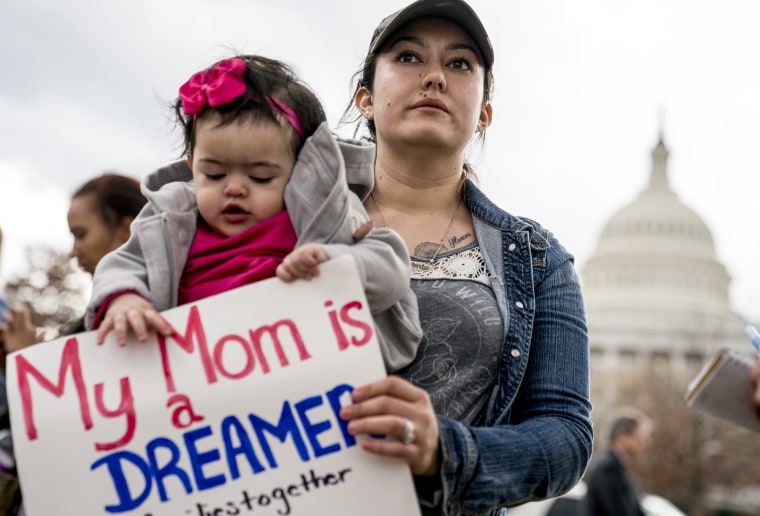WASHINGTON — After months of bickering, the Senate voted 97-1 Monday to begin debate on a variety of immigration issues, setting up a process that is likely to be time-consuming and chaotic with an outcome that is anything but certain.
Senators from both parties are readying proposals for the coming days and weeks but finding the support of at least 60 senators needed to pass legislation to address the most pressing of matters hasn't gotten any easier.
The process that began Monday fulfills a promise by Senate Majority Leader Mitch McConnell — who usually tightly controls the legislative calendar and prefers to prevent members of the Republican conference from having to vote on controversial legislation that could be used as attack ads in campaigns — to allow the Senate to debate and vote on a variety of proposals, regardless of the outcome.
The debate will center around the fate of those covered by the Deferred Action for Childhood Arrivals program (DACA), whose legal status could be in limbo after March 5, the date President Donald Trump set for the expiration of the program. A federal court, however, has ruled that Trump can’t end the program, creating additional uncertainty.
Congress hasn't passed a major reform on immigration in 30 years and any attempt to thread contentious issues like DACA and border security through both parties is fraught with pitfalls. Passing a package in the Senate with 60 votes or more could help pressure a defensive White House and the House of Representatives to support it — or it could be a recipe for failure.
“This entire immigration debate is designed to fail, and it will,” one pessimistic Senate aide told NBC News, citing the 60-vote threshold as a major obstacle.
"Getting to 60 votes is going to take a lot of negotiation,” Sen. Orrin Hatch, R-Utah, said on the Senate floor Monday.
One major unknown is Trump himself, who has heavy sway among his base and thus the GOP senators who worry about angering those voters. His positions, however, have been inconsistent and have given immigration negotiators whiplash, indicating his support for proposals followed by an immediate rebuke of those same measures.
Trump's latest take on the issue came in a Tuesday morning tweet in which he wrote that the March DACA deadline marked Congress's "last chance."
"Negotiations on DACA have begun. Republicans want to make a deal and Democrats say they want to make a deal," he wrote. "Wouldn’t it be great if we could finally, after so many years, solve the DACA puzzle. This will be our last chance, there will never be another opportunity! March 5th."
Different groups of Senators have been have been huddling for weeks to craft measures to propose. Half a dozen for them introduced a framework offered by the president, which they say has the best chance of passing the House and being signed into law.
“The best we can determine, this is trying to work with the White House to be able to determine what’s a White House compromise.” Sen. James Lankford, R-Okla., one of the co-sponsors, told MSNBC Sunday.
McConnell on Monday threw his support behind the proposal for the first time. It creates a $25 billion fund for border security, provides a 12-year path to citizenship for 1.8 million 'Dreamers' — people brought to the country illegally as children — prohibits the parents of Dreamers from being sponsored for citizenship or legal status, limits family-based migration of immigrants to the nuclear family and ends the diversity visa lottery.
Most, and maybe all, Democrats are opposed to the plan. “Dreamers should not be held hostage to President Trump’s crusade to tear families apart and waste billions of American tax dollars on an ineffective wall,” Sen. Dick Durbin, D-Ill., said.
The most controversial parts of the president’s proposal are limits to family migration and ending the diversity lottery. Sen. Lindsey Graham, R-S.C., said those are the “problem areas” blocking consensus.
“The Democrats have moved on border security very close to the president’s number. If you could do a deal with border security and 1.8 million Dreamers, that would probably get a lot of votes,” Graham said. “When you start talking about chain migration and doing away with the diversity lottery, you run into a wall.”
Proving the difficulty of coming to consensus, a group of two dozen senators have been meeting consistently for the past three weeks in an attempt to come up with a bipartisan plan. But those efforts have yet to produce any product.
Frank Sharry, executive director of the pro-immigration group America's Voice, said the self-named "Common Sense Caucus" consists of members who have not traditionally worked on immigration.
"It’s very difficult," Sharry said. "They’re amateurs at immigration, and they're learning it’s really complicated."
Also failing to come to any consensus is the group of leaders who have been meeting with White House officials, including Chief of Staff John Kelly, for more than a month. Those talks have moved the discussion nowhere, according to one Democratic source and a White House aide. Administration officials say that the president’s offer is generous — particularly offering a path to citizenship for such a large number of Dreamers — and they are not willing to move any further to accommodate Democrats.
But for the first time in years, the Senate will build legislation from scratch, through the process of debates and voting on amendments. Durbin said some senators who elected in recent years have never seen the Senate work.
“That is what the Senate historically has been all about, and we haven’t seen it for so long that I think it’s going to be a welcome surprise to a lot of people,” Durbin said. “Stay tuned and watch democracy. This is what it’s all about.”
